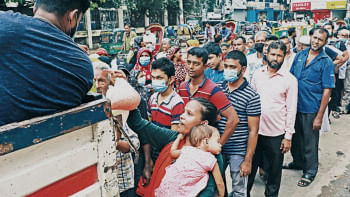WHO worried about ‘Mu’ variant
The World Health Organization has said it is monitoring a new coronavirus variant known as "Mu", which was first identified in Colombia in January.
Mu, known scientifically as B.1.621, has been classified as a "variant of interest", the global health body said Tuesday in its weekly pandemic bulletin.
The WHO said the variant has mutations that indicate a risk of resistance to vaccines and stressed that further studies were needed to better understand it.
"The Mu variant has a constellation of mutations that indicate potential properties of immune escape," the bulletin said.
There is widespread concern over the emergence of new virus mutations as infection rates are ticking up globally again, with the highly transmissible Delta variant taking hold -- especially among the unvaccinated -- and in regions where anti-virus measures have been relaxed.
All viruses, including SARS-CoV-2 that causes Covid-19, mutate over time and most mutations have little or no effect on the properties of the virus.
But certain mutations can impact the properties of a virus and influence how easily it spreads, the severity of the disease it causes, and its resistance to vaccines, drugs and other countermeasures.
The WHO currently identifies four Covid-19 variants of concern, including Alpha, which is present in 193 countries, and Delta, present in 170 countries.
Five variants, including Mu, are to be monitored. After being detected in Colombia, Mu has since been reported in other South American countries and in Europe.
The WHO said its global prevalence has declined to below 0.1 percent among sequenced cases. In Colombia, however, it is at 39 percent.
The coronavirus has killed at least 4,518,163 people since the outbreak emerged in China in December 2019, according to an AFP compilation of official data yesterday.
'STILL NEED TO BE CAREFUL'
As Indonesia and Thailand start to ease Covid-19 curbs after seeing case numbers fall, health experts said cases of new infections could rise again with vaccination rates still low.
After containing the coronavirus better than much of the world last year, Southeast Asia has turned into a global epicentre in recent months with the arrival of the virulent Delta variant.
Although case numbers are still rising fast in most of the region, Indonesia and Thailand, which have its largest economies, have started to lift curbs on dine-in restaurants and shopping malls to ease the economic pain of their lockdowns.
Indonesia reported 10,534 new cases on Tuesday, five times fewer than its peak in mid-July, while Thailand reported 14,802 new cases yesterday, down 37% from its mid-August peak.
However, experts said relaxations carried dangers with a low level of vaccination and a shortage of testing, with rates of positive tests often above the 5% recommended by the WHO.
"We are definitely concerned around the reopening without meeting all the criteria proposed by the WHO," Abhishek Rimal, Asia Pacific Emergency Health Coordinator at the International Federation of Red Cross and Red Crescent Societies, told Reuters.
"Now with the Delta variant, which is highly transmissible, and the low vaccination rate, we could very well see a surge of Covid-19 in days to come."
Indonesia has recently had a positive test rate of 12% and Thailand 34%. "Surveillance is not that great, we still need to be careful," said Tri Yunis Miko Wahyono, a University of Indonesia epidemiologist.
Indonesia has recorded more than 4 million coronavirus cases in total and more than 133,000 deaths from Covid-19 since the start of the pandemic. Thailand has reported 11,841 deaths and 1.2 million cases.
The two countries both have first vaccination rates at around 30% with Indonesia having fully vaccinated 17% and Thailand 11%. Their capitals, Jakarta and Bangkok, have much higher levels of vaccination.
In Jakarta and some areas on the populous Java island, restaurants inside shopping malls could have a 50% dine-in capacity, and shopping malls could stay open until 9:00 pm, while factories are permitted to operate at 100% capacity.
Bangkok and 28 other provinces listed as having the most severe outbreaks can similarly reopen dine-in restaurants at a capacity between 50%-75%, with opening hours capped at 8:00 pm, the same as shopping malls.
The economic benefits of easing lockdowns were understandable, said Dale Fisher, a senior infectious disease expert at the National University Hospital in Singapore, but he stressed that they also must vaccinate their citizens faster.
"As you ease off the lockdowns, how much sort of punishment can you take before you have to bring a lockdown back in and be and be stronger? The answer's in the vaccine," he said.
The Philippines, another Southeast Asian country, topped two million cases yesterday as the country battles a record surge in infections.
In recent weeks, daily case rates have hit the highest levels since the start of the pandemic and the health department warned the trend could continue.
Yesterday's official data show the country recorded 14,216 new infections, taking the total caseload to just over two million, with 33,533 deaths in the country of 110 million people.

 For all latest news, follow The Daily Star's Google News channel.
For all latest news, follow The Daily Star's Google News channel. 



Comments